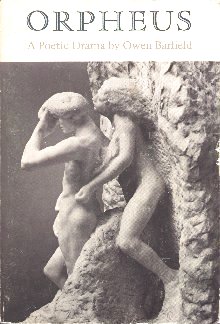The text on this page is from David Lavery, "An Owen Barfield Readers Guide." Seven 15 (1998): 97-112.
|
Orpheus: A Poetic Drama |
Orpheus: A Poetic Drama. Ed. John C. Ulreich, Jr. West Stockbridge, MA: Lindisfarne Press, 1983.
He
shall ascend Parnassus
awake and find his soul:
Proteus
shall work unsleeping for ever, and forms shall flow
As
the meaning of words a poet has mastered. It shall be so
That
Zeus shall abandon to Cronos
the antique starry crown,
And
softly out of Olympus the high Gods shall come down
Shedding
ambrosial fragrance in clouds that for ever abide,
And
earth shall be covered with blushes and make herself sweet as a bride.
And
her light shall be liquid as honey, her air taste good like bread
In
the mouths of them that dwell upon earth, and all shall be fed. (Orpheus
112)
